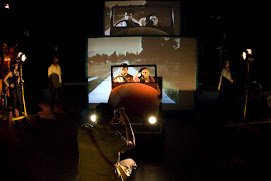‘A great deal of nonsense is written about characters in fiction—from those who believe too much in character and from those who believe too little. Those who believe too much have an iron set of prejudices about what characters are: we should get to “know” them; they should not be “stereotypes”, they should “grow” and “develop”; and they should be nice. So they should be pretty much like us. A glance at the thousands of foolish “reader reviews” on Amazon, with their complaints about “dislikeable characters”, confirms a contagion of moralising niceness. Again and again, in book clubs up and down the country, novels are denounced because some feeble reader “couldn’t find any characters to identify with”, or “didn’t think that any of the characters grow.”’ James Woods, A life of their own, The Guardian, 26 January 2008.
I’m with James Woods on this; the reason I find Brecht’s character Mother Courage interesting is because despite all that happens to her, she doesn’t change—or ‘grow’.
Anyway, as I work on script segments for Disappearance, and Fearless N goes into rehearsal, I’m still thinking about this whole vexed issue of script development; trying to articulate why I have such profound misgivings about ‘free-floating’ script development programs and initiatives.
Interestingly enough, both Disappearance and Fearless N have been developed with the companies and collaborators committed to the productions, and in ways that don’t focus exclusively, or even primarily, on the written text. Instead, creative development periods have been used to progress the design, explore sound and musical ideas, and try out various approaches to performance. Discussions have dealt not only with the written component, but with the interaction of all the works’ theatrical elements.
Will post some more thoughts on script development soon.
In the meantime, here’s the link for James Wood’s article about character/s. Although he’s talking about characters in literary fiction, his comments offer food for thought to playwrights, dramaturgs, and anyone involved in the ‘script development’ industries.
29 January 2008
Subscribe to:
Posts (Atom)
+Photo+Leah+McGirr+3.jpg)


